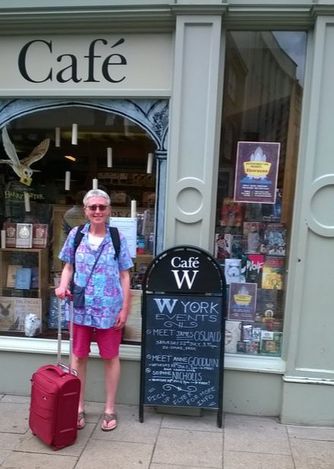| If there is one area where struggling-to-be-noticed writers have the advantage over those who’ve been published since they were barely out of school, it’s our inside knowledge of the world of work. Coming to writing later in life, or merely being part of the majority unable to support themselves through writing, we have the experience to bring our characters’ jobs alive. But there can still be challenges in taking our characters to work. For example, while setting your novel in your current workplace obviates the need for a research trip, you might have to smooth some colleagues’ ruffled feathers once the book is out in the world. From another angle, if you’ve gained your work experience in settings crowded with colleagues, you face the challenge of rendering it authentically without overwhelming the reader with an overabundance of characters. |
| I placed Diana in a university with which I was familiar both as a student and external teacher, although I’d never been on the staff. Part of the plot required her to be employed within a large organisation, but it took effort to pare down her relationships to the minimum possible to make the story work. Before the final draft, I needed to cut one friend, a supportive lecturer within her own department who had grown quite fond of, and leave one vulnerable student to stand in for the hundreds Diana would have taught. |
| With two hospital settings in my second novel, Underneath, there are no prizes for guessing where I’ve spent most of my working life! But I’m indebted to my husband for the narrator Steve’s work, in a general hospital, while his partner Liesel’s, in a forensic mental health setting, is loosely based on somewhere I know only indirectly through attending meetings there. |
What’s your experience of reading or writing about people at work? You can find most of my reviews of novels showing characters in a fictional workplace, via this link.
| This week, Charli Mills is calling for 99-word stories about an epic workplace. Although this isn’t the sense in which she meant it, given my recent wrangling with the hero’s journey story structure, I couldn’t resist playing with the idea of working for a company that manufactures elixir: |
Bile stinging her throat, she pressed the green icon.
“Homer here.” His tone gave nothing away.
“Thanks for …” Her whole future in that pause.
“Congratulations!”
Joy of joys! She didn’t need to hear more. But was she up to it? Could she bear to uproot herself and begin again somewhere new? “Sorry, I’ll have to turn it down.”
“Excellent!”
Excellent? They didn’t want her after all? She reran his offer in her head: I’m calling to invite you on the adventure of working with us. Of course: to earn the elixir, an employee must first reject the call.

























 RSS Feed
RSS Feed





















